《原来如此 》-又到了美国人最卷的日子 ,这是奔着考研去的么 ?
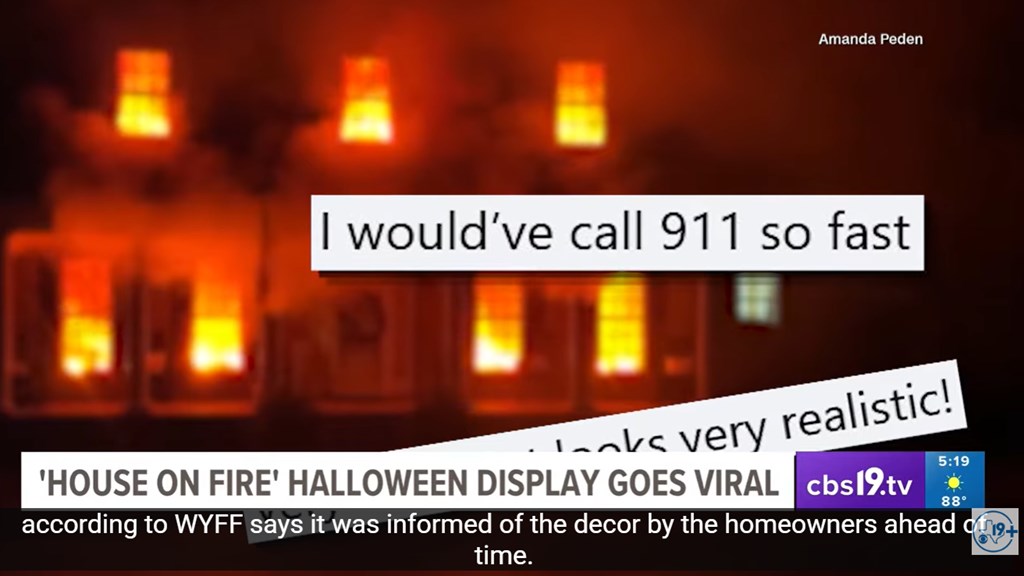


酒 馆 | 福 利

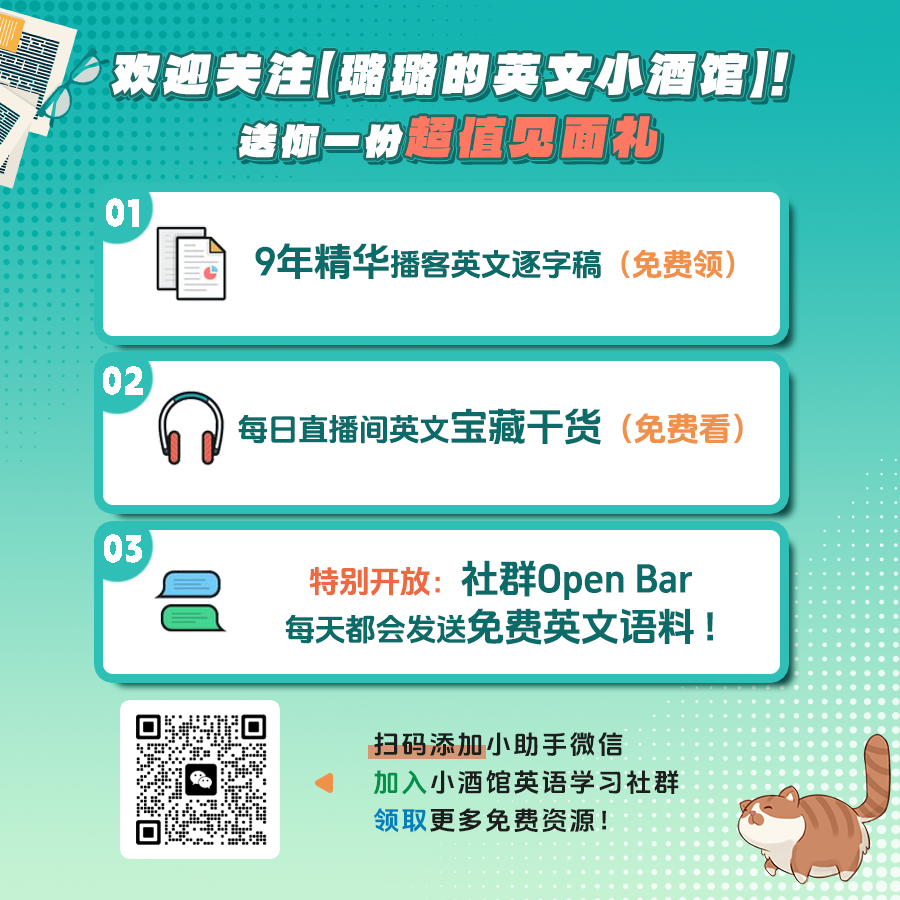
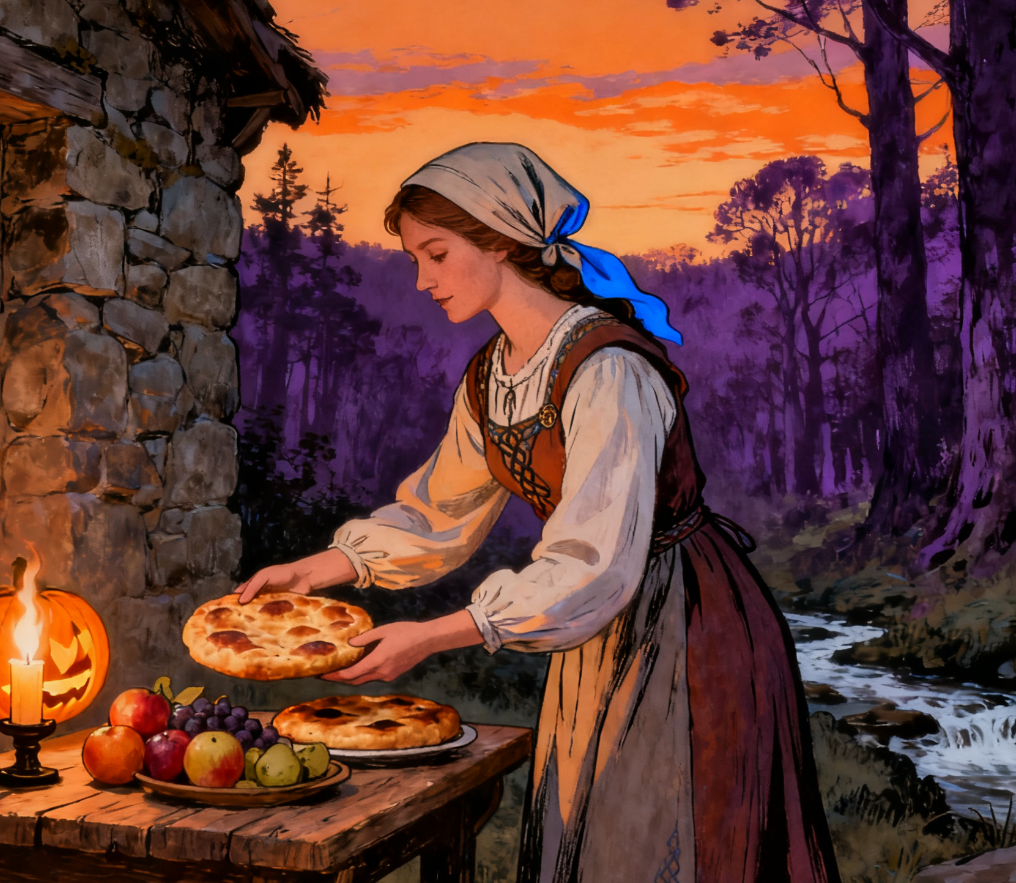
图片均来源于网络 | 侵删
加小助手VX【luluxjg2】领取全文逐字稿

Why do we trick or treat
at Halloween?

The tradition of trick-or-treating has ancient roots going back to Celtic and Christian festivals.
▼
During the Celtic festival of Samhain, people left food outside to please wandering spirits.
▼
In medieval Europe, poor people (especially children) went door to door asking for food or coins in return for prayers for the dead — this was called “souling.”
▼
In Scotland and Ireland, people dressed up in costumes and went “guising,” offering to sing, tell jokes, or perform tricks in exchange for treats.
▼
When Irish and Scottish immigrants moved to the United States, they brought these customs with them.
▼
By the early 20th century in the U.S., trick-or-treating became more popular as a way for children to celebrate Halloween safely and socially.
▼
The phrase "trick or treat" means that the child is offering a choice: give me a treat, or I might play a trick!
▼
Today, it’s a fun tradition where children dress up in costumes, go house to house, and collect sweets or small toys.

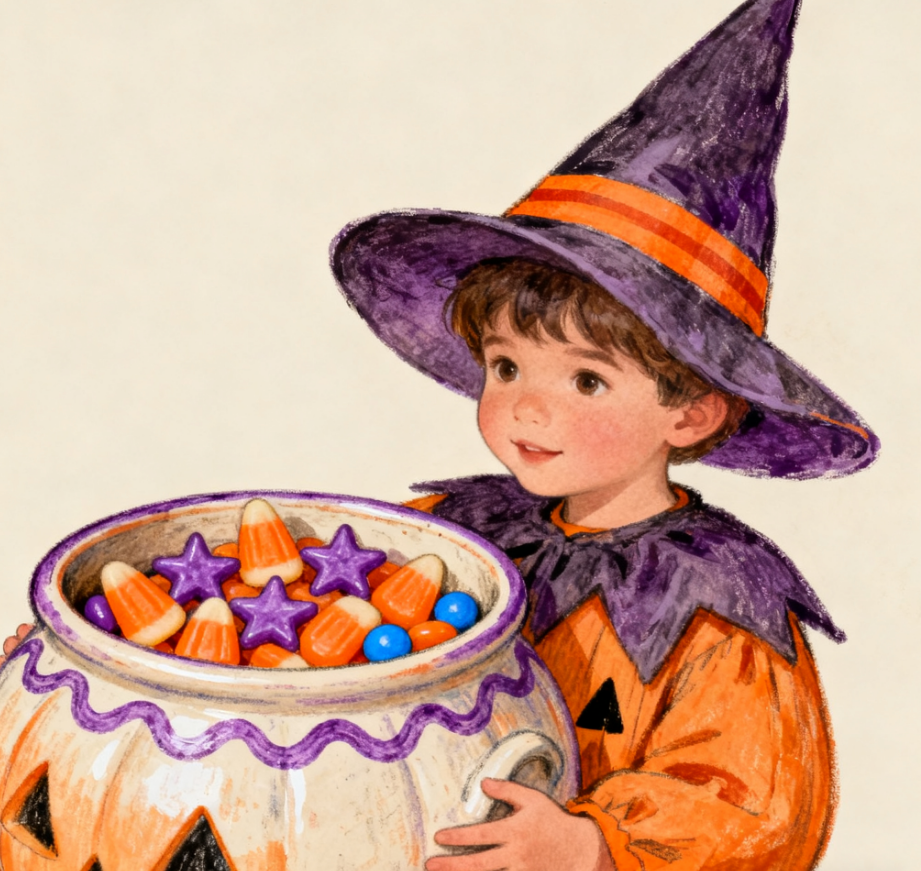

Useful Phrases
Expressions
“Trick or treat!”
– The phrase children say when knocking on doors.
“Go trick-or-treating”
– To walk around asking for candy.
“Dress up in costume”
– Wear special clothes for Halloween.
“Knock on doors”
– Visit neighbours during Halloween night.
“Give out candy”
– Hand treats to children at the door.
“A Halloween tradition”
“Spooky fun”
– Scary in a playful or fun way.

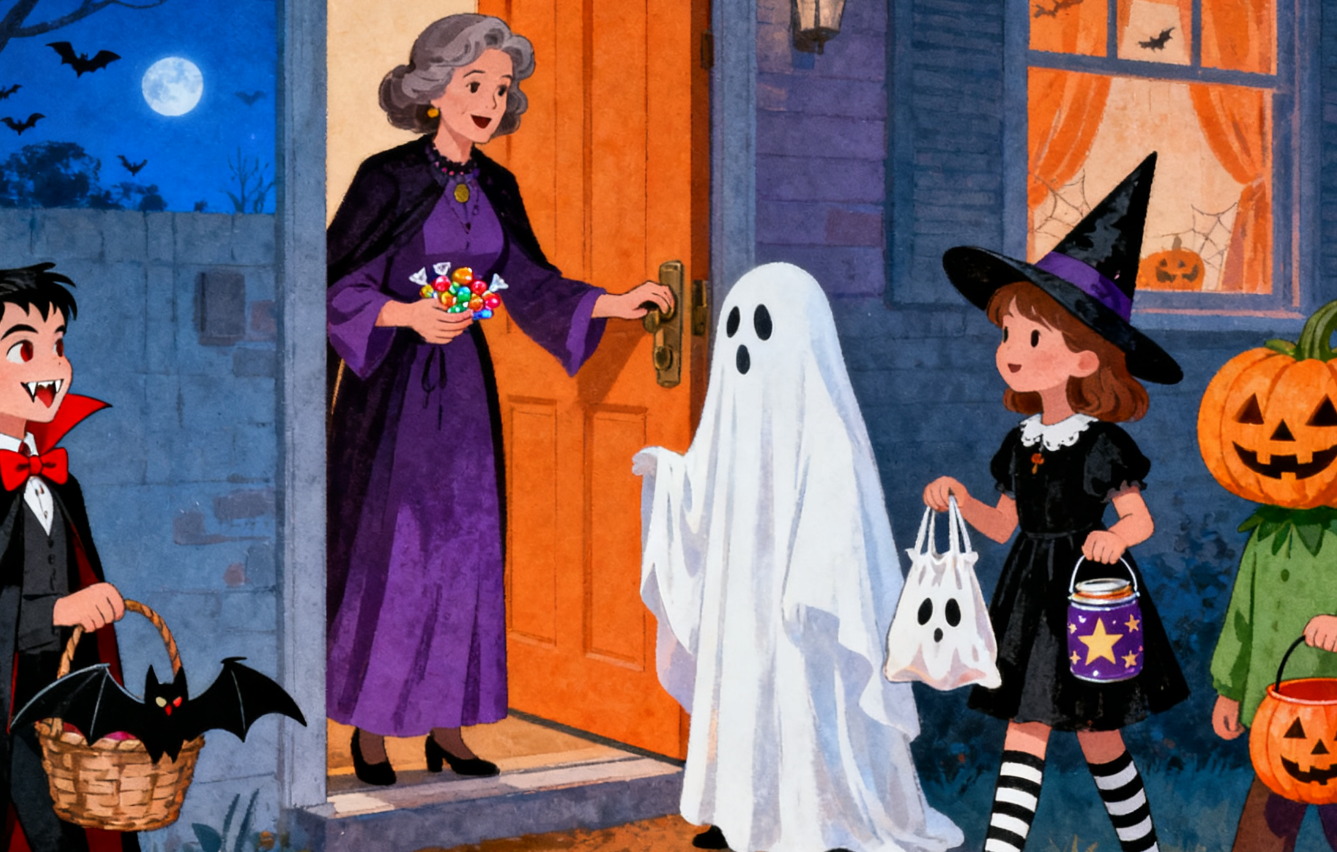
Hi, everyone and welcome back to the segment called 【Oh, So That's Why!】《原来如此》. Hi 安澜.
Hi, Lulu, hi, everyone.
So still remember our last episode about Halloween costumes?
Oh Yes.
So in this episode, we are going to get into the bottom of it, of more about Halloween, the Trick-or-Treat custom.
Remember in this segment 安澜and I will always go get to the bottom of some of the customs in western culture and cultures in general and tell you about their origin story.
所以今天我们还是我们的万圣节特别版. 我们上次说了万圣节为什么要穿各种各样的道具服, 这种costumes为什么要变装.
Today we're gonna talk about Trick-or-Treating不给糖就捣蛋.
So once again, this comes back to ancient festivals. Now in the previous episode, we talked about the Celtic festival of Samhain.
萨温节就是凯尔特的, 我们上一集说过的.
Now during this festival, people left food outside to please wandering spirits as an offering to them.
Wandering spirits, wander as in you just walk around. Is that a little bit like the Chinese 游魂野鬼的感觉, kind of ,not that scary, is it?
No, they're just wandering around. So this is a way kind of protecting yourself during that time.
So because we were talking about during Samhain, especially All Hallows’ Eve, Halloween, 万圣节前夜. This is when the gate between this world and the underworld or this world and the other world, the sort of the gate opens, so they were allowed to come in to our world.
Yeah. Now there's also other festivals as well in medieval Europe and in Scotland and Ireland where people went door to door asking for food or coins in return for prayers for the dead. This was called “souling”.
So this was not during Samhain.
No. But this would happen around major holidays, for example, Christmas, they used to do this as well.
Is this the origin of Christmas carolling?
Kind of. Yeah.
So you go door to door asking for food or coins. And then in return, you will give prayers for the dead (Yes ) in the household. or you would sing a song.
有点像圣诞颂歌感觉Christmas Carol.
Yeah. And in Scotland and Ireland, people would dress up in costumes and go guising usually around New Year's Day, New Year's Eve. And they would sing, tell jokes or perform tricks in exchange for food or treats.
Guising as in disguise (yeah) to dress up. Okay, so either medieval Europe or Scotland, Ireland as traditional Celtic places, there were traditions even though it wasn't during Samhain, 虽然不是萨温节的, 但是从中世纪开始他们就有这样的传统, 就凯尔特地区, 包括整个的欧洲中世纪, they would go door to door, knock on every door and they would either beg or ask for food or coin and they will say a prayer (yeah) or they would dress up and then they will perform a little bit and then they would ask for like treats.
Treats would be like a little bit of food and maybe like a snack, things like that.
Or even a drink.
Even a drink , yeah, let's go door to door. Do you have a beer?
Pretty much.
Ok, so that probably all added together to the whole trick or treat.
Yea. When Irish and Scottish immigrants moved to the United States, they bought these customs with them. And by the early 20th century, the idea of trick-or-treating became very popular but for children to celebrate Halloween.
Adults going trick or treating, no, you would get the weapon to defend yourself.
Yeah .
But just for some of our listeners if they're not very familiar with trick-or-treating what is “trick-or-treat”, this all comes from kids go to your door, knock on your door and then they ask “Trick or Treat?” .
Yeah.
If it's a treat. Treat就是你要给糖, 但是这个treat不一定是糖, for example, we give pets treat, I give my cat a treat, 给猫猫小零食, 小鱼干, 这个就叫give your cat a treat, you give a kid a treat, usually it's candy bar, chocolate bar. That sort of thing.
So you will give them a treat. So they will leave you alone because if you don't give them a treat, you say oh we don't have candy, then they would play a trick on you.
Yeah, so these tricks would be, for example, throwing toilet paper over the house, TP (Toilet Paper) your house, TP your house or throwing eggs at the house, that’s a bit vicious, but I would say nowadays I'm not sure so much about the States, but in the UK at least, children do go trick-or-treating, but there's a rule that you only go to houses that actually have Halloween decorations up.
That's another thing I wanted to ask. You can't expect everyone, first of all, to open doors to strangers, no, even though they're kids, but you know it's still quite risky. It is.
And second of all, you can't expect every family, every household to prepare so much candy bars and treats for kids. So there's a sign, right? If you participate, you would put like Halloween decorations up.
Yeah.You might have your door open, for example. So maybe like a neighborhood, they would have a Halloween party, so they know which houses to go to and which ones not to go to.
So it's quite common in for example, the UK that people just turn off their lights, they pretend they're not a home.
I mean you can just like really put a sign out there. We're not participating in trick-or-treating, but then you're probably gonna be very unpopular in the neighborhood.
Yeah, exactly.
I think it's all like a community thing plus this day and age who would allow their kids to go trick or treat alone, they won’t.
No, they wouldn't. They would always have an adult with them.
And adults or if they're teenagers, they will go as groups.
Yeah. But then again, with teenagers, probably a lot of people wouldn't open the doors to teenagers.
Yeah, teenagers are... no... So there's a cutoff point. Enjoy it if you're a kid, because once you hit like 13, no, you're cut off.
Yeah, pretty much.
I forgot whether it's Modern Family or one of these American sitcoms or comedy shows. And then there was this bit where to clearly overgrown kids, they're like adults wearing costumes and masks and still knocking at the door and say, do you have candy? It's like, dude, you're like 30, get off my property.
Yeah, exactly, that people would find quite frightening I would say.
Yeah. When you're an adult, the only way you can get away with trick-or-treating is bringing your kids. Yeah.
But I mean most people they participate in trick-or-treating they will definitely prepare treats, right? Who would be like come and play tricks on me, I dare you.
Yeah. They would you know make it clear that they're taking part and they would actually have sweets and treats.
Okay. And as we're wrapping up this episode, let us go through some of the expressions. First of all, trick-or-treat.
Yeah, so this is what children would shout out when they're knocking on doors, trick-or-treat.
Trick or treat.
And they would go trick-or-treating.
So for example, your kid is going trick-or-treating with his or her friends.
Yes. And they would always dress up in costumes.
That's another thing, they're expected to make an effort.
Yeah, if they're just wearing like a cheap mask, people will probably be less inclined to give them that much.
Yeah. But if they're wearing elaborate costume like what a lovely princess, what a lovely ballerina, you are a very convincing Batman...
Exactly yeah. So as part of this, they would go knocking on doors. So that means visiting neighbors.
And for the households that are participating, they're giving out candy.
Yeah, so It's a Halloween tradition and a little bit of spooky fun.
Spooky fun. If you remember the modern family episodes like Claire really likes Halloween, she and Phil they would decorate the entire house into some sort of House of the Damned, and they waste a lot of money on all the decorations.
Yeah, some people are really into Halloween.
I guess it's a day where you can really play dress up. You can add that little bit of theatrical, elements, exactly, into your otherwise mundane life. Yeah.
Okay, on that note, we're gonna wrap up here. Leave us a comment in the comment section, tell us what you think and put in your request for what else you want us to talk about in the segment or in other segments.
So until next time .
We'll see you next time.
Bye
Bye.
排版长图:
文稿校对:
图片来源:
Jer.ry
王全勤 & Jenny
均来源于网络 | 侵删
▻▻▻
最后,因为微信公众号推送机制的变革,
现在没有星标的账号,很容易就错过推送,
所以如果你喜欢小酒馆的推文,
拜托一定一定别忘记
⭐星标⭐【璐璐的英文小酒馆】哦,
星标不迷路!
点开公众号名片,点击右上角“…”
再点击“设为星标”即可,在酒馆等你哦~ 👇
酒馆铺子
全球小众精品好物聚集地:
(点击以上图片,Get世界精选好物)

酒馆需要你的 点赞,在看,收藏!
动动手指为我们的小酒馆助力吧~
















